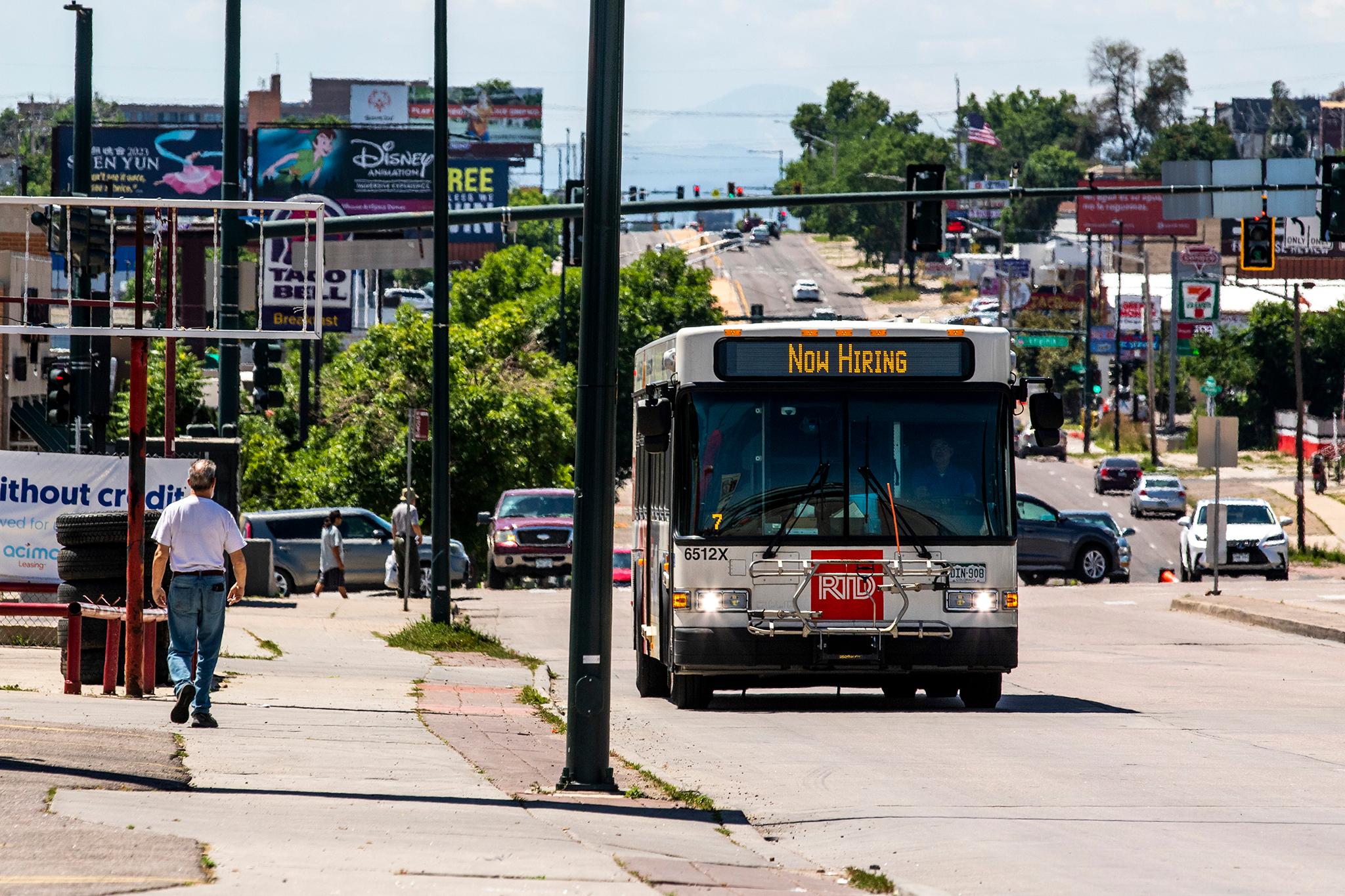
The chair of the Colorado Senate’s transportation committee is working on a bill that would increase funding for public transit across the state, including the Regional Transportation District in the Denver metro.
New revenue sources could include imposing new fees and asking voters to increase taxes, said Sen. Faith Winter, D-Westminster.
“We need to make sure every solution is on the table,” Winter said in an interview.
The bill will also attempt to increase density in transit-supportive corridors and accountability of RTD’s elected board. Winter said she and her co-sponsors, Reps. Junie Joseph, D-Boulder, Williams Lindstedt, D-Broomfield, and Sen. Nick Hinrichsen, D-Pueblo, are in the early stages, collecting feedback from interested parties and drafting the bill.
Depending on its scale and whether it’s ultimately successful at the Capitol next session, the bill could mark a key piece of legislative Democrats’ ongoing push to densify cities and promote climate-friendly alternatives to driving. It could also address long-standing frustrations with RTD among public officials and taxpayers who are still waiting on promised rail lines to be built and bus service to be restored after pandemic-era cuts.
The bill is meant to address equity and climate concerns.
Transportation is the largest single source of greenhouse gas emissions in Colorado. The state needs more public transit service to meet its goals of reducing emissions and increasing mobility for people who rely on transit, Winter said. A new stream of state funding would allow transit agencies to add more routes and boost existing ones, she added.
“We know with increased frequency — and when you make it easy — that more people will use [public transit],” she said.
Most of the funding for RTD, by far the largest public transportation provider in the state, comes from a local 1 percent sales tax. A small portion of its budget comes from fares, and it typically receives little to no state funding. The massive 2021 state transportation funding bill, co-authored by Winter, set aside no direct revenue streams for the district.
That 2021 bill did increase a state grant program available to transit agencies, but RTD has not applied for any of that funding, which has frustrated Winter.
“It is a very reliable source of funding,” she said at a Monday committee meeting at the state Capitol.
RTD’s CEO and general manager Debra Johnson and board chair Lynn Guissinger both declined to comment on the potential legislation until a bill has been drafted.
But advocates for public transit are excited by the prospect of more state funding. The last time RTD secured a major new funding source was in 2004, when it convinced a majority of the region’s voters to approve a new sales tax to build out its sprawling rail network, said Danny Katz, executive director of the Colorado Public Interest Research Group.
“It's time to make a similar large investment to expand service so that buses and trains are coming every five to 10 minutes, that the stops and stations are nice with shelters and benches and that it's the kind of system that really provides people choice and more options to get around without always having to drive,” he said.
Katz’s group is part of the “Alliance To Transform Transportation,” a coalition of advocacy groups that includes the Denver Streets Partnership, the Colorado Cross-Disability Coalition, GreenLatinos, the Natural Resources Defense Council, and the NAACP, which is exploring a transit funding ballot measure for the Denver region.
The bill would also push for more density near transit.
Earlier this year, Democratic lawmakers and Gov. Jared Polis pushed a sweeping mandatory upzoning bill that would have pushed cities to build in a more transit friendly way. But during the debate for that bill, many local elected officials complained the state wasn’t funding more transit service. The bill ultimately failed.
Winter’s new bill is meant to address those concerns while also revisiting the goals of the failed upzoning bill. It could incentivize or mandate local governments to allow more density and affordable housing near transit-supportive corridors, she said.
“I want all solutions to be on the table, and I want to be creative,” said Winter, a former Westminster City Councilor. “And coming from local government, I understand that those folks that are implementing these policies have to be on board. And I'm committed to doing that.”
Kevin Bommer, executive director of the Colorado Municipal League, which represents many of the state’s cities and led the fight against the upzoning bill, said he was “really encouraged” by Winter’s approach of collecting feedback before she drafts a bill.
“Obviously anything with incentives — that's the way to go,” he said.
The legislation could take aim at RTD’s governance, too.
RTD has gone through its highs and lows over its 50-plus years as an agency. One peak was the successful 2004 FasTracks vote that funded a massive passenger rail buildout.
But RTD’s inability to complete all of those lines, especially the planned commuter rail line between Denver, Boulder and Longmont, combined with service cuts and historically high fares, have all contributed to frustration with RTD among taxpayers and elected officials — including the governor.
“Everyone, including RTD, knows that improvements need to happen,” Winter said.
Winter wants to make sure there’s “transparency and accountability” around how RTD spends its revenues, though the exact mechanism through which she hopes to achieve that isn’t yet clear.
“We need to first make sure our resources that we're already spending on transit are being used to their best value,” Winter said.
Related stories
- At a rare public meeting on RTD’s long-delayed Boulder train, residents find a glimmer of hope
- Colorado’s statewide e-bike rebates launched Aug. 16. Here’s how to qualify
- A Denver woman was on a crusade to improve her RTD bus shelter. Now, it’s gone
- Thinking of buying an electric car in Colorado? You could soon get $26,500 in discounts









